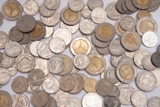Foreign coins and notes for exchange with Cash4Coins
None of us like seeing money go to waste, and how would you feel if you had money lying around that you could never use? Well, surprisingly, most of us have… in the form of foreign coins! This is because foreign coins can only be exchanged in the country of origin; therefore, for the most part, people tend to put them away and never use them.
But what if there was a quick, simple, and hassle-free way to exchange your foreign coins? One where you received quick payment (within an hour) and the transaction was guaranteed… that would be fantastic… wouldn’t it? Well, you’ll be pleased to know that such an excellent service exists and is available right here in the UK.
At Cash 4 Coins, we exchange all foreign coins and notes. Our service is quick and very straightforward. That’s why we are the trusted partner for banks, hospitals, schools, clubs, airlines and airports, businesses, charities, attractions and individuals like you. If you’d like to send us coins, click the Start Exchange button below.
Why are there so many foreign coins and notes for exchange?
Although they aren’t legal tender in the UK, foreign coins and notes often end up in people’s pockets anyway. Their lack of official value means they can’t be exchanged at airports, and travellers frequently return from abroad with pockets full of small change. Over time, these collections can accumulate. Interesting designs and memories of travels can make spare coins from overseas treasured mementoes.
With around 200 countries worldwide, most issuing their own coins, there is a bewildering array of foreign coins available. The most common coins encountered in the UK are the Euro coins, used in 22 European nations, along with coins from other English-speaking countries such as the United States and Canada. Canadian coins are sometimes even found in tills in the UK because of the resemblance between Canadian and British low-denomination coins.
Some coins commonly found in British households even originate from currencies that no longer exist, such as the French franc or Spanish peseta. These currencies were replaced by Euro coins in 2002, but as popular holiday destinations for British tourists, these countries have contributed coins to many British collections.
With their busts of monarchs and national symbols, British coins may seem a little dull compared to the unusual designs of some foreign coins. For example, coins of the Croatian kuna display various Croatian natural plants and animals on the reverse side. This can result in the somewhat odd sight of a tuna on the reverse of the two-kuna coin. The reverse of Latvian one-lats coins minted in 2011 shows a tankard of beer with a frothing head, symbolising the Latvian summer solstice festival.
Some older coins, as well as modern Japanese coins, feature distinctive holes in the centre. The practice of piercing coins probably started in ancient China to make it easier to store coins by hanging them on a cord, but modern coins with holes are designed to be distinguished more easily by touch from coins without.
Some of the world’s more unusual coins are less likely to appear in the pockets of returning travellers. For instance, the Canadian $1 million coin is minted from 100 kilograms of solid gold, with only five known to exist.
Whether brought back from overseas travel or acquired as part of a collection, foreign coins can be either worthless clutter or treasured mementoes of other places and times.
Need Help
Contact our friendly experts on 0161 635 0000 or email admin@cash4coins.co.uk

